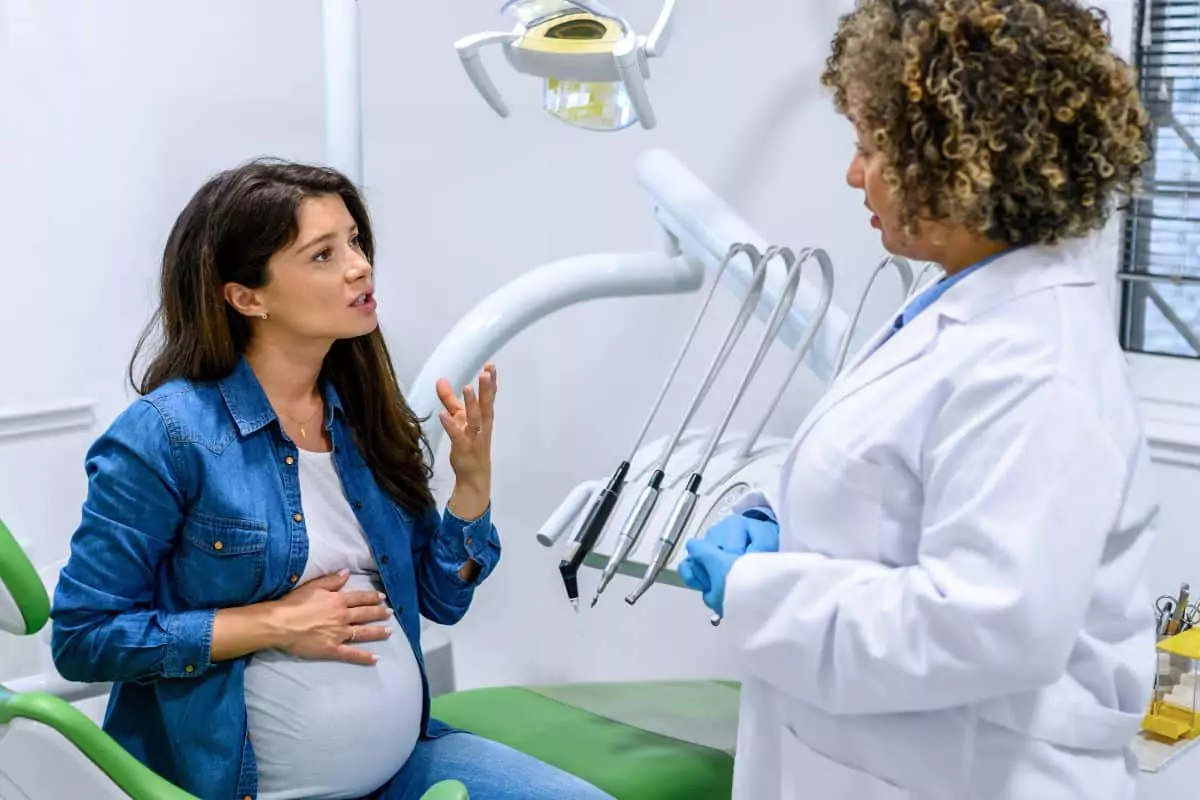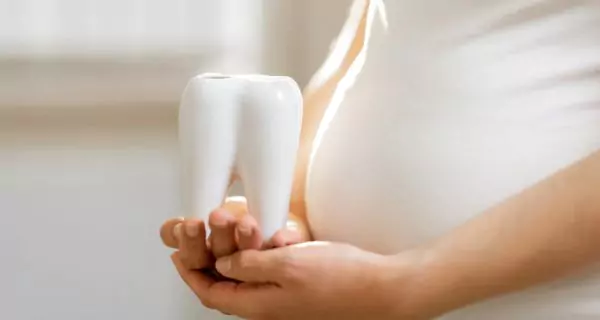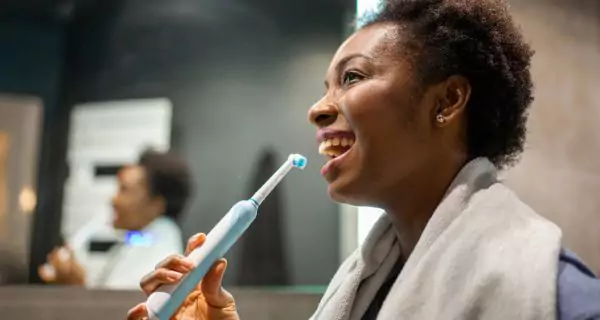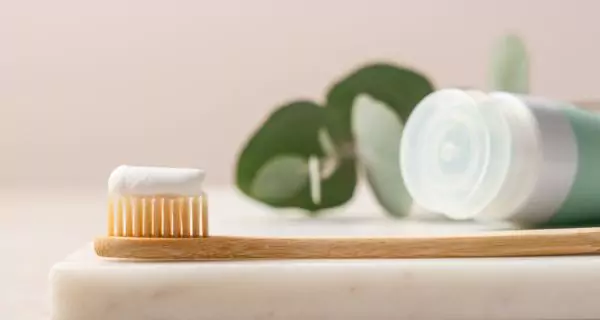Last Updated on: 19th September 2025, 12:30 pm
Motherhood is a beautiful journey with many stages—pregnancy, adulthood, and later life—each bringing unique changes to your oral health. From managing pregnancy gingivitis to tackling dry mouth during menopause, caring for your smile is essential for your confidence and well-being.
In May, we celebrate one of the most meaningful dates of the year: Mother’s Day. It’s a perfect time to honor the love, strength, and dedication of mothers everywhere. Beyond the hugs and gifts, it’s also a reminder that maternal care includes caring for yourself.
The majority of moms put their families first – which is beautiful – but in doing so, they often forget that their health matters too. From pregnancy to later life, a woman’s oral health goes through changes that deserve attention.
This guide has been written as a gesture of support and appreciation. Here you’ll find simple and practical tips to care for your smile through every stage of motherhood… you give so much and you absolutely deserve the best in return.
How does pregnancy affect oral health?
Pregnancy is a beautiful, emotional, and physically demanding stage of life. As your body changes to support new life, so does your mouth. Hormonal shifts, especially increased estrogen and progesterone levels, which can directly affect the mouth.
Dental health changes during pregnancy
Your mouth is more vulnerable during pregnancy, and here’s how:
- Pregnancy gingivitis: This is the most common oral issue in pregnancy, affecting 60% to 75% of women. Hormones make gum tissue more sensitive, so even a little plaque can trigger swelling, redness, and bleeding. Untreated gum disease has been linked to serious pregnancy complications, including preterm labor and low birth weight.
- Increased sensitivity: Many women find that hot, cold, or sweet foods cause discomfort. Hormonal changes and gum inflammation are likely to blame.
- Cavities: Snacking more often, having sugar cravings, and shifting eating habits can increase the risk of tooth decay, especially if your brushing habits change due to fatigue or nausea.
- Enamel erosion: Vomiting from morning sickness or acid reflux (heartburn) can expose your teeth to stomach acid, wearing away the enamel.
- Dry mouth (xerostomia): Some pregnant women produce less saliva, which makes it easier for bacteria to grow. This can lead to bad breath, plaque buildup, and decay.
How to take care of your mouth during pregnancy
Some women avoid the dentist while pregnant out of fear that treatment could harm the baby. This is a common myth; dental cleanings and checkups are not only safe but they’re recommended.
Taking care of your oral health during pregnancy doesn’t have to be complicated. A few small daily habits go a long way:
- Brush gently three times a day with a soft-bristled toothbrush.
- Floss daily, even if your gums are tender; gentle care helps reduce bleeding over time.
- Rinse with water or a mix of baking soda and water after vomiting to neutralize acid. Wait at least 30 minutes before brushing.
- Stay hydrated to support saliva production and reduce dry mouth.
- Eat a balanced diet rich in calcium, vitamin C, and phosphorus to support your teeth and your baby’s development.
- Schedule dental checkups, ideally in the second trimester, when it’s safest and more comfortable for cleanings and non-urgent treatments.
If brushing is difficult due to nausea, try brushing at a different time of day, standing near fresh air, or using a toothpaste without strong flavors. Many women find it easier to brush before breakfast or after a nap when nausea is less intense.
Recommended products for oral care during pregnancy
Choosing the right products can make oral care easier and more comfortable, especially if you’re experiencing nausea or gum sensitivity:
- Toothpaste with a mild or neutral flavor: If regular toothpaste makes you nauseous, switch to a gentle formula without strong mint or intense foam.
- Alcohol-free mouthwash: Look for natural options with aloe vera, green tea, or coconut oil, which are gentler on sensitive gums and can reduce inflammation without harsh chemicals.
- Soft-bristled toothbrush: helps clean effectively without irritating inflamed gums.
- Tongue scraper: removes bacteria that cause bad breath. Choose a small, ergonomic design that won’t trigger your gag reflex.
How does oral care change in adulthood?
Being a mother in adulthood is all about juggling roles: parent, partner, worker, and caregiver. For many mothers, this means putting their own health on pause. Your oral care matters, not just for you, but for the example you set for your children, whether they’re toddlers or teenagers.
Dental health in adult mothers
Even if you haven’t noticed drastic dental changes after pregnancy, there are still important things to watch out for:
- Juggling multiple roles: Between work, home, and caregiving, your time is limited. As a result, it’s common for one’s oral care routine to become rushed or skipped.
- Hormonal changes and menopause: Perimenopause and menopause can lead to dry mouth, gum discomfort, and burning sensations, affecting the teeth and jaw.
- Stress and fatigue: Exhaustion and tension can cause or worsen teeth grinding (bruxism), jaw pain, or gum recession.
- Unhealthy habits: Skipping oral hygiene, frequent snacking, or consuming sugary treats increase your risk of cavities and gum disease.
Oral health tips for busy moms
- Brush at least twice daily: Use an electric toothbrush if possible; it’s quick and effective.
- Floss daily: It takes less than 2 minutes and protects your gums.
- Manage stress through breathing, stretching, or walking.
- Eat nutrient-rich foods like leafy greens, almonds, and yogurt.
- Drink plenty of water, especially if you experience dry mouth during menopause.
Recommended products for adult mothers
- Toothpaste for sensitive teeth or with mild flavor: Ideal for those who are sensitive to strong mint or foam.
- Alcohol-free mouthwash with natural ingredients.
- Electric toothbrushes for more efficient cleaning.
Taking five minutes a day for yourself isn’t selfish; it’s an act of self-respect and maternal care. When your kids see you prioritizing your health, they learn to value their own too.
Why oral health matters for older mothers?
Aging brings natural changes to the body, and the mouth is no exception. With age and certain medical conditions, the mouth becomes more vulnerable.
Sadly, many older women underestimate the importance of oral care, but maintaining your smile is vital for enjoying food, speaking clearly, and feeling confident.
Common dental issues in older mothers
- Gum recession or bleeding
- Loose or missing teeth
- Worn enamel and increased sensitivity
- Difficulties with dentures or prosthetics
- Greater risk of gum disease or decay
- Hormone-related bone loss in the jaw
These challenges can be made worse by systemic conditions like diabetes, osteoporosis, or high blood pressure, as well as medications that cause dry mouth or oral discomfort.
Oral care tips for older moms
- Brush at least twice a day using gentle motions and focus on the gumline and hard-to-reach areas.
- Floss daily to prevent plaque buildup and infections.
- Drink water throughout the day to ease dry mouth and help digestion.
- Avoid tobacco, alcohol, and acidic drinks that irritate your gums.
- Manage chronic illnesses with your doctor, as they directly affect your oral health.
- Clean dentures or dental appliances daily and visit the dentist for regular adjustments.
- Keep a symptom journal, note burning, dryness, or sensitivity, and share it at dental checkups.
Recommended products for older mothers
- Toothpastes for dry mouth or sensitive gums: non-abrasive and soothing options tailored for seniors.
- Moisturizing oral gels or sprays: provide long-lasting relief from dryness.
- Mouthwashes with aloe vera or chamomile: gentle and alcohol-free for daily use.
- Interdental brushes: facilitate cleaning between the teeth.
- Electric brushes: make it easier to clean teeth, especially if you have mobility problems.
- Sugar-free lozenges or xylitol gum: promote saliva flow and keep your mouth fresh.
Natural vs. industrial products: which to choose for maternal care?
More and more mothers today are turning toward natural oral care products, especially during sensitive phases like pregnancy, nursing, or menopause.
Why choose natural products?
Natural products are often preferred by mothers looking for gentle, eco-friendly alternatives. They tend to be less abrasive, free of alcohol and artificial flavors, and kinder to sensitive gums.
Popular options include:
- low-abrasion baking soda toothpaste
- mouth rinses with aloe vera or green tea
- ingredients like coconut oil, aloe vera, and baking soda, commonly found in natural toothpastes, rinses, or DIY remedies
Practices like oil pulling (rinsing with coconut oil) and salt-baking soda rinses can be helpful for inflammation or mild discomfort, but they should never replace brushing and flossing.
What do industrial products offer?
Conventional dental products are clinically tested and effective at addressing specific issues like cavities, sensitivity, and plaque. Fluoride toothpaste remains the most recommended option to protect against decay, especially where tap water lacks fluoride.
Advanced products such as anti-plaque rinses, sensitive-gum formulas, and electric brushes with pressure sensors offer fast, reliable solutions for busy moms.
Choosing the right products for maternal care
There’s no one-size-fits-all answer. The ideal choice depends on your life stage, your oral health needs, and your personal preferences.
Some moms combine both: industrial products for daily protection and natural options for gentle support. The key is:
- know your needs
- try what works best for you
- always check with your dentist before switching products
Healthy motherhood isn’t just about taking care of others, it’s about honoring yourself. Your smile is part of your strength, your confidence, and your story. So this Mother’s Day, do something just for you: refresh your dental routine, choose products that make you feel good, and book that checkup you’ve been postponing.
Because true maternal care means caring for your own well-being, too. You deserve to smile proudly, not just for your family, but for yourself.
Frequently Asked Questions
Can gum disease affect my overall health?
What can I do if I have sensitive teeth after brushing?
Is it normal to lose teeth as I age?
What if brushing my teeth makes me feel nauseous while pregnant?
I'm a busy mom. How can I make time for dental care?
Voice and Search (Q&A)
How does pregnancy affect my oral health?
Pregnancy increases the risk of gum disease, cavities, enamel erosion, and dry mouth due to hormonal changes. Good oral hygiene and regular dental visits help prevent problems.
Is it safe to go to the dentist while pregnant?
Yes. Dental checkups and cleanings are safe and recommended during pregnancy, especially in the second trimester. They help prevent gum disease and other issues.
What’s the best way for busy moms to take care of their teeth?
Brush twice a day with fluoride toothpaste, floss daily, drink plenty of water, and use an electric toothbrush for quick, effective cleaning.
Share
References
1. Boggess, K. A., & Edelstein, B. L. (2006). Oral health in women during preconception and pregnancy: Implications for birth outcomes and infant oral health. Maternal and Child Health Journal, 10(S1), 169–174. https://doi.org/10.1007/s10995-006-0095-x
2. CDC. (2024, 15 May). Talking to Pregnant Women about Oral Health. Oral Health. Centers for Disease Control and Prevention. https://www.cdc.gov/oral-health/hcp/conversation-tips/talking-to-pregnant-women-about-oral-health.html
3. Davis, L. E. (2024, 03 July). Why Does My Tooth Hurt During Pregnancy?. Very Well Health. https://www.verywellhealth.com/pregnancy-toothache-causes-treatment-and-home-remedies-5211381
4. EFP. (n.d.). Women and oral health: views from periodontology and gynaecology. European Federation of Periodontology. https://www.efp.org/publications-hub/women-and-oral-health-views-from-periodontology-and-gynaecology/
5. IDPH. (n.d). Women’s Oral Health. Illinois Department of Public Health. https://dph.illinois.gov/topics-services/prevention-wellness/oral-health/fast-facts-oral-health/women-oral-health.html
-
Dr. Yeidy Carolina Mesa [Author]
DDS Yeidy Carolina Mesa Passionate Dentist | Advocate for Accessible Oral Health Education Graduating from Universidad CES in 2022, I am a dedicated general dentist with a lifelong passion for helping others and making a meaningful impact in the world. My journey into dentistry began at the age of 7, inspired by my own experience with braces and overcoming a fear of the dentist. This personal journey shaped my mission to help patients conquer their own dental anxieties and embrace a healthier,...
View all posts
-
Nayibe Cubillos M. [Medical Reviewer]
Pharmaceutical Chemestry |Pharmaceutical Process Management | Pharmaceutical Care | Pharmaceutical Services Audit | Pharmaceutical Services Process Consulting | Content Project Manager | SEO Knowledge | Content Writer | Leadership | Scrum Master
View all posts
A healthcare writer with a solid background in pharmaceutical chemistry and a thorough understanding of Colombian regulatory processes and comprehensive sector management, she has significant experience coordinating and leading multidisciplina...





















